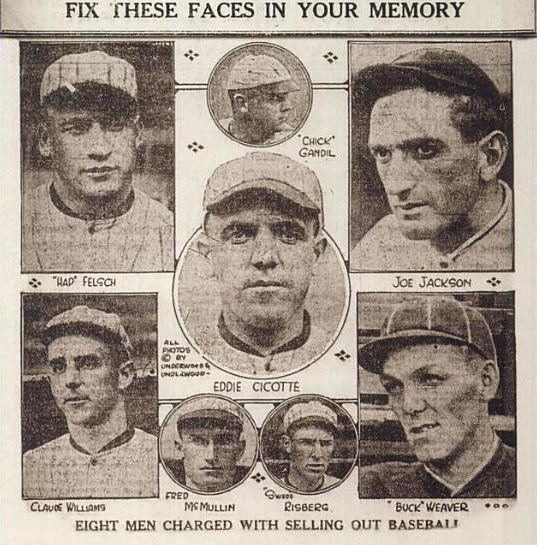
Black Sox Scandal
The Black Sox Scandal was a Major League Baseball game-fixing scandal in which eight members of the Chicago White Sox were accused of losing the 1919 World Series against the Cincinnati Reds on purpose in exchange for money from a gambling syndicate led by organized crime figure Arnold Rothstein. In response, the National Baseball Commission was dissolved and Judge Kenesaw Mountain Landis was appointed to be the first Commissioner of Baseball, given absolute control over the sport to restore its integrity.
"Black Sox" redirects here. For other uses, see Black Sox (disambiguation).Despite acquittals in a public trial in 1921, Commissioner Landis permanently banned all eight players from professional baseball. The Baseball Hall of Fame eventually defined the punishment as banishment from consideration for the Hall. Despite requests for reinstatement in the decades that followed (particularly in the case of Shoeless Joe Jackson), the ban remains in force.[1]
Fallout[edit]
Grand jury (1920)[edit]
Rumors of the fix dogged the White Sox throughout the 1920 season as they battled the Cleveland Indians for the American League pennant, and stories of corruption touched players on other clubs as well. At last, in September 1920, a grand jury was convened to investigate; Cicotte confessed to his participation in the scheme to the grand jury on September 28.[13]
On the eve of their final season series, the White Sox were in a virtual tie for first place with the Indians. The Sox would need to win all three of their remaining games and then hope for Cleveland to stumble, as the Indians had more games left to play than the Sox. Despite the season being on the line, Comiskey suspended the seven White Sox still in the majors (Gandil had not returned to the team in 1920 and was playing semi-pro ball). He later said he had no choice but to suspend them, even though this action likely cost the Sox any chance of winning a second pennant. The Sox lost two of the three games in the final series against the St. Louis Browns and finished in second place, two games behind the Indians, who went on to win the 1920 World Series.
The grand jury issued its decision on October 22, 1920, and eight players and five gamblers were implicated. The indictments included nine counts of conspiracy to defraud.[14] The ten players not implicated in the gambling scandal, as well as manager Kid Gleason, were each given $1,500 bonus checks (equivalent to $22,800 in 2023) by Comiskey in the fall of 1920, the amount equaling the difference between the winners' and losers' share for participation in the 1919 Series.[15]